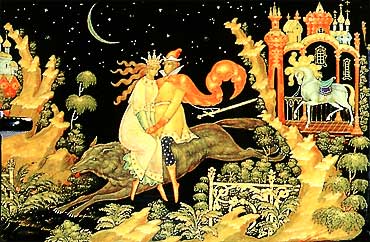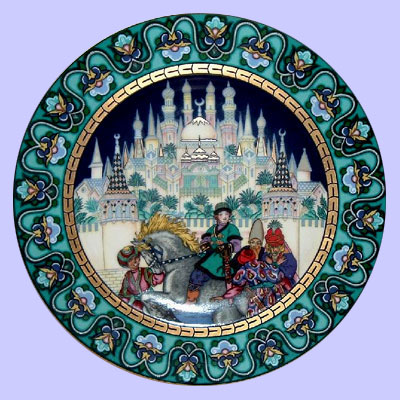 Mercedes Lackey's Firebird is a good story, yet left me somehow unsettled. It retells the ballet story, which combines the Russian character with other folklore scenes and characters.
Mercedes Lackey's Firebird is a good story, yet left me somehow unsettled. It retells the ballet story, which combines the Russian character with other folklore scenes and characters.The first half I found almost boring. Ilya was not technically the youngest son, as in traditional fairy lore, but fulfilled the role of the underestimated "fool". The brothers were unrealistically stupid, and they spent so much time beating up Ilya and he spent so much time recovering from their beatings, it got tiring. Plus, pain is not something the reader can vicariously experience (not like they want to either). Situations, characters, can be very real to the reader, but descriptions of pain are hard to connect with, especially if there are too many of them.
Finally the Firebird came and things began to happen. I did also like Lackey's twist on the simpleton son-Ilya fakes idiocy in order to protect himself. By the way, is it too late to warn for spoilers? Several plot elements were altered but the scenes progress in the plotline of the ballet version. Lackey also includes the animal helper theme included in many fairy tales, and one of the animals is a fox, probably alluding to one of the better known oral versions of Firebird. In this story, the Firebird bestows on Ilya the gift of understanding animals. This is another common folklore motif-the protagonist assisting an animal, who later comes back to aid him.
 Anastasiya Kazakova
Anastasiya Kazakova
 Anastasiya Kazakova
Anastasiya KazakovaThe thing that most bugged me was Lackey's portrayal of women. Granted, it is told from a man's perspective, in a very chauvenistic culture. But Ilya is portrayed as the ultimate hero who can do no wrong, a direct contrast to his selfish brothers and father. Yet he only sees women as sex objects, yet supposedly he is the enlightened one for not abusing them like the other males. In this society, women who are beautiful have to sleep their way to higher positions, yet none of the women ever seem to have a problem with this. The end of the story provides an interesting twist-he had fallen in love with the most beautiful tsarina, and they were betrothed. This is where the ballet ends, with the assumption that they all live happily ever after, but the book goes on. Ilya discovers Tatianna's selfishness and realizes he does not love her, but the Firebird. After she's caught cheating on him with his brother, he leaves her, guilt-free, to go back to the Firebird.
 Lev Lominago
Lev Lominago
In theory, I like this twist. But first of all, it seems to me to diminish the mystery and magic of the Firebird to have her fall in love with a mortal-I like that she wasn't part of any romance in the ballet version. That's a more minor point though. The whole thing reminded me of the Disney movie Enchanted-the moral is, you actually can't have love at first sight, but Giselle and the dude fall in love after two whole days of aquaintance (or, in the case of Idina Menzel's character and the Prince, we're back to love at first sight-technically, first dance.) The circumstances contradict the message. Although it's a family comedy, I give it the benefit of the doubt and don't think too hard about it.
 Lev Lominago
Lev LominagoIn theory, I like this twist. But first of all, it seems to me to diminish the mystery and magic of the Firebird to have her fall in love with a mortal-I like that she wasn't part of any romance in the ballet version. That's a more minor point though. The whole thing reminded me of the Disney movie Enchanted-the moral is, you actually can't have love at first sight, but Giselle and the dude fall in love after two whole days of aquaintance (or, in the case of Idina Menzel's character and the Prince, we're back to love at first sight-technically, first dance.) The circumstances contradict the message. Although it's a family comedy, I give it the benefit of the doubt and don't think too hard about it.
This book, however, is not for children. Given the sexual content, it's for mature young adults and adults, so I expect more consistency in messages. Here, Ilya's had a couple conversations (including a dangerous mission, but still, very short on bonding time here) with the Firebird-so, exactly one more than he had with the Princess before betrothal, and we're supposed to imagine that this is true love? And somehow, although he was foolish enough to pledge himself to a stranger just because she's hot, she comes across as the villain and he just the innocent victim. Earlier in the book, there is a character that enforces the stereotype that fat girls are fat because they have no self-discipline and just eat everything in sight, and also they're all probably stupid too. Though Ilya at one point thinks that her heart is better than his beautiful betrothed princess, he as much as stated earlier that it would be impossible for a man to love a woman who was fat and ugly-and this from the most gentlemanly character of all.
Overall, reading this book just made me feel like I, as a woman, had no worth unless I was beautiful and sexually appealing to men, which disappointed me, especially coming from a female author. Oh, she pays lip service to the character part, but the Firebird just happens to be inhumanly, stunningly beautiful at the same time. It was an interesting, quick read but I probably won't go back to it.
Overall, reading this book just made me feel like I, as a woman, had no worth unless I was beautiful and sexually appealing to men, which disappointed me, especially coming from a female author. Oh, she pays lip service to the character part, but the Firebird just happens to be inhumanly, stunningly beautiful at the same time. It was an interesting, quick read but I probably won't go back to it.


No comments:
Post a Comment